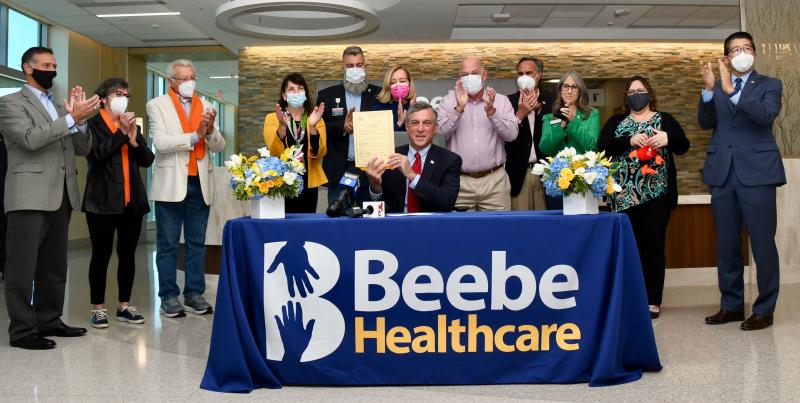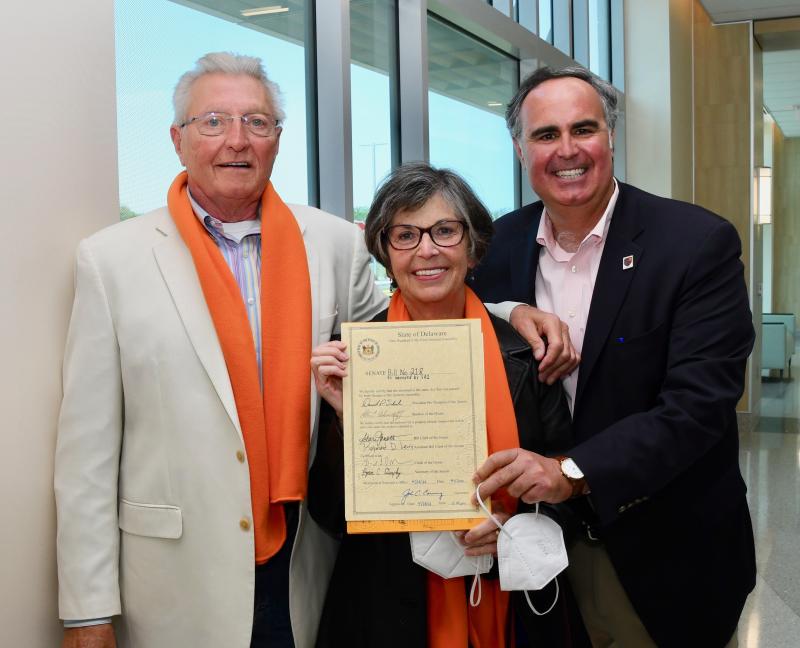Act ends discrimination against organ donors

Two people on a mission can make a change impacting thousands of people.
Charles and Patricia Harvey of Lewes were running into roadblocks getting health insurance for Patricia after she donated one of her kidneys to her husband for a transplant eight years ago. Charles said any insurance they could get was extremely costly. They soon found out that in Delaware, that practice was not illegal and was commonplace.
That's when they made a call to Sen. Ernie Lopez, R-Lewes, for assistance. It didn't take long for Lopez to gain support from co-sponsors Rep. Steve Smyk, R-Milton, and Speaker of the House Rep. Pete Schwartzkopf, D-Rehoboth Beach, to begin the process to author Senate Bill 218 – the Living Donor Protection Act – to make it illegal for insurance companies to discriminate against living organ or tissue donors in Delaware.
The Harveys were front and center as officials gathered April 28, with Gov. John Carney at the new Beebe Specialty Surgical Hospital near Rehoboth Beach to sign SB 218 into law.
“This legislation started with a phone call,” Lopez said. “Now the bill will make a big difference to a lot of people. Having to pay a higher rate for or even being denied insurance coverage because of one’s status as a living organ donor is wrong. I am proud of the bipartisan collaboration and unanimous support for SB 218, and I am pleased Gov. Carney signed the legislation into law here in Sussex County.”
He said every member of the Senate signed on as a co-sponsor and the bill passed unanimously in the House.
Schwartzkopf had a personal interest in the legislation. In 2006, Schwartzkopf donated one of his kidneys to longtime friend Missy Jones. He said both of them have had no side effects over the past 16 years.
Schwartzkopf said 400 people in Delaware are awaiting transplants. He said in 2021, a record number of 40,000 transplants were done in the United States.
“Discrimination comes in all forms, but the idea that an insurance company could discriminate against a person who has donated an organ to save another person’s life is wrong, and is why we need this new law,” Schwartzkopf said. “As a living organ donor, I’m aware of the shortage of people signed up to donate. We need to be doing everything we can to encourage more people to be organ donors, not put up barriers. This law will tear down one of those barriers.”
“There is a large gap between those needing transplants, and the organs and tissues available to them,” Smyk said. “According to the United Network for Organ Sharing, there are currently more than 106,000 people in need of a lifesaving organ transplant. This number does not include those requiring less dire, but still important, donations. I am proud to be a part of this bipartisan initiative to help bridge this critical shortfall.”
Nicole Scharf, associate executive director of the National Kidney Foundation of Maryland and Delaware, who is also a kidney donor, said 90 percent of the people awaiting transplants are in need of a kidney. She said with the passage of the bill, more money can be directed toward transplants and less to dialysis. “This will encourage a lot more people to be a living donor,” she said.
The act prohibits discrimination based on an individual’s status as a living organ or tissue donor in the offering, issuance, cancellation, coverage, price or other condition of an insurance policy, including a life, health, disability or long-term care insurance policy. At least 20 states have similar laws, including Maryland, New Jersey and Pennsylvania.
SB 218 took effect immediately upon receiving Carney’s signature.
Read the bill at https://legis.delaware.gov/BillDetail/79129.






















































